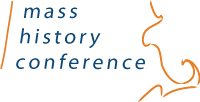Never Done: Interpreting the History of Women at Work in Massachusetts
Improve listing
Presented by
Mass Humanities
A Conference for Massachusetts History Organizations
Presented by Mass Humanities, Massachusetts Historical Society, University of Massachusetts Amherst Public History Program, University of Massachusetts Boston Public History and Archives Track, The Colonial Society, and Elizabeth & Ned Bacon
SAVE THE DATE
Monday, June 2, 2014
9:00am - 4:00pm
Hogan Campus Center, College of Holy Cross, Worcester
(registration will begin in April)
Keynote Address by Laurel Thatcher Ulrich - Upstairs, Downstairs, and All Around the House: Making Work Visible
Take, for instance, Anne Bradstreet, Mum Bett, Edmonia Lewis, Frances Perkins, and Joyce Chen. Massachusetts women all, they labored mightily throughout their days and changed the world in the process. Their names, and the names of many other women who were in the forefront of change, are familiar to most of us. Far too often, however, their lesser-known sisters' stories get lost in the "larger narrative" of industry, politics and conflict—even the narratives told about the local movers and shakers in our towns.
Seen from the distance history brings, women's lives are shaped by conventions, expectations, and images of what "women's work" is and should be. Upon close examination, however, we find individual tales of great and compelling variety, lives lived with courage and determination, extensive negotiations with convention. From century to century, toiling in homes, hospitals, offices, schools, shops, factories—on the streets, in the fields and on the battlefields, running businesses, organizations and households, on the right and wrong sides of the tracks and of the law—women have undertaken the possible and impossible, the visible and the hidden, to provide for themselves and their families and otherwise maintain the social contract, to move towards a better future.
The time is right: women's work and women's history are inching back on the agenda; new digital tools are allowing us much greater access to the lives of ordinary women of the past; finally, the first generation of women born to vote, whose great-granddaughters are wondering what feminism might be for, is ready to be debriefed about their experiences. The stories of these women are of great interest to our audiences, to women in the workforce (including legislators), not to mention our daughters and granddaughters, nieces and protégées. The tenth annual Massachusetts History Conference will explore how to find and collect women's stories, share them with our audiences, and become stronger organizations in the process. Join us in raising Clio's consciousness once again!